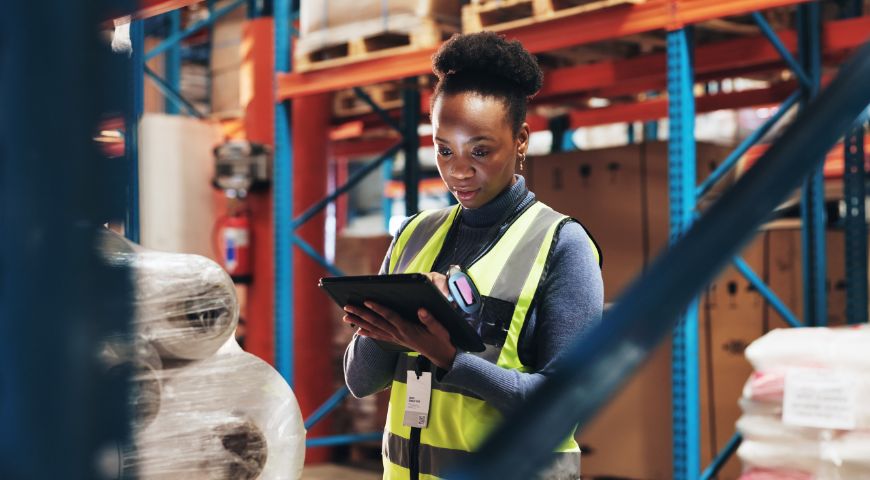
The Rise of AI in Supply Chain Management: Smarter Logistics, Faster Deliveries
The logistics industry is undergoing a transformative shift thanks to the adoption of AI-driven technologies, machine learning, and predictive analytics. As companies face increasing demands for speed, efficiency, and accuracy, the integration of AI has become a game-changer. From inventory management to route optimization and enhanced customer service, AI’s impact on supply chain management is reshaping the way goods are stored, transported, and delivered.
1. AI-Driven Inventory Management: Smarter Stocking, Fewer Shortages
Effective inventory management has always been a cornerstone of a smooth supply chain. Traditionally, companies relied on historical data and manual forecasting methods to plan stock levels. However, with AI-powered analytics, businesses can now predict demand more accurately and adjust inventory in real-time.

For instance, AI algorithms analyze market trends, customer purchasing patterns, and seasonal fluctuations to ensure that inventory is replenished before it runs low. This reduces the risk of stockouts and overstocking, resulting in better cost control and increased customer satisfaction. Real-time data from tank container depots in India reveals that AI-driven inventory solutions have helped companies reduce holding costs by up to 15% while improving fulfillment rates.
2. Route Optimization: Faster Deliveries at Lower Costs
Another area where AI shines is route optimization. By processing vast amounts of data—such as traffic patterns, weather conditions, and shipment priorities—AI systems can determine the most efficient delivery routes. This not only speeds up transportation but also reduces fuel consumption and minimizes shipping costs.
ISO tank operators in India have already begun leveraging AI to plan routes that avoid delays and ensure on-time deliveries. For example, AI-powered platforms can reroute shipments dynamically if a traffic jam occurs, ensuring that time-sensitive cargo like chemicals or food-grade liquids arrives without delay. Companies working with the best logistics agents in India report a significant decrease in transit times and a reduction in overall transportation expenses, all thanks to AI’s predictive routing capabilities.
3. Predictive Analytics and Proactive Maintenance
AI’s ability to predict future outcomes is perhaps its most valuable trait. In supply chain management, predictive analytics can identify potential bottlenecks before they happen, allowing companies to proactively address issues. For instance, machine learning models can forecast delays due to bad weather, labor shortages, or supplier disruptions, giving logistics managers the opportunity to adjust schedules and allocate resources more efficiently.
Moreover, AI-driven maintenance systems monitor equipment and vehicles in real time. These systems predict when a vehicle or container might need servicing, reducing the risk of unexpected breakdowns. For businesses relying on ISO tank depot services, predictive maintenance ensures that tanks and equipment remain in top condition, avoiding costly downtime and keeping operations running smoothly.
4. Enhancing Customer Service with AI
In today’s fast-paced world, customer expectations are higher than ever. AI-powered chatbots and virtual assistants provide instant responses to queries, helping customers track their shipments, confirm delivery times, and get real-time updates. This not only improves the overall customer experience but also frees up human staff to focus on more complex tasks.
Supply chain management for ISO tanks has also benefited from AI-enhanced customer service. By integrating AI tools, companies can provide their clients with accurate, up-to-date information about the status of their shipments. For example, a business shipping specialty chemicals in ISO container tanks can offer live tracking and automated notifications, ensuring that customers always know the exact location of their cargo.
5. Promoting Your AI-Driven Expertise
As the industry continues to embrace AI, showcasing your capabilities on social media is crucial. Share how your company is leveraging AI technologies on platforms like Instagram, LinkedIn, and Facebook. Highlight case studies, before-and-after efficiency metrics, and client success stories. By doing so, you establish your brand as a forward-thinking leader in logistics, attract more customers, and build lasting trust.
Conclusion: A Smarter, More Agile Supply Chain
The rise of AI in supply chain management has unlocked unprecedented levels of efficiency, reliability, and customer satisfaction. From smarter inventory planning to real-time route adjustments, AI is transforming logistics at every level. Companies using AI-driven tools for their ISO tank containers and logistics services are not only improving performance but also setting a new standard for the industry.



